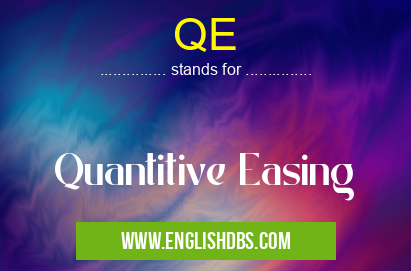What does QE mean in UNCLASSIFIED
QE, short for Quantitative Easing, is a monetary policy tool employed by central banks to stimulate economic growth during periods of economic downturn. This policy involves the large-scale purchase of financial assets, primarily government bonds and mortgage-backed securities, from financial institutions and the general public.

QE meaning in Unclassified in Miscellaneous
QE mostly used in an acronym Unclassified in Category Miscellaneous that means Quantitive Easing
Shorthand: QE,
Full Form: Quantitive Easing
For more information of "Quantitive Easing", see the section below.
How QE Works
By purchasing large quantities of assets, central banks increase the money supply in the economy. This influx of liquidity lowers interest rates, making it cheaper for businesses to borrow and invest, and for consumers to spend. The goal of QE is to boost aggregate demand and encourage economic activity.
Benefits of QE
- Stimulates economic growth: QE can help to lift the economy out of recession by encouraging investment and spending.
- Lowers interest rates: By increasing the money supply, QE makes it cheaper for businesses and consumers to borrow money.
- Inflates asset prices: The purchase of assets by central banks can inflate the prices of stocks, bonds, and real estate.
Risks of QE
- Inflation: If QE is not implemented cautiously, it can lead to inflation as the increased money supply exceeds the demand for goods and services.
- Asset bubbles: QE can contribute to asset bubbles, as investors may speculate on the rising prices of assets purchased by central banks.
- Long-term debt: The large-scale purchase of assets by central banks can lead to an increase in government debt, which may have long-term fiscal implications.
Essential Questions and Answers on Quantitive Easing in "MISCELLANEOUS»UNFILED"
What is Quantitive Easing (QE)?
QE is a monetary policy tool used by central banks to stimulate economic growth by increasing the money supply. It involves the central bank purchasing large quantities of government bonds and other financial assets from banks and financial institutions.
How does QE work?
By purchasing these assets, the central bank increases the money supply, making it easier for banks to lend money to businesses and consumers. This increased liquidity can lead to lower interest rates, encouraging borrowing and investment, thereby stimulating economic growth.
What are the goals of QE?
QE is typically used to address economic downturns or recessions. Its goals include:
- Increasing inflation to meet target levels
- Lowering interest rates to encourage borrowing and investment
- Stimulating economic growth and job creation
What are the potential risks of QE?
While QE can be effective in stimulating growth, it also poses potential risks:
- High inflation if the money supply is increased too rapidly
- Asset bubbles if asset prices rise too quickly
- Currency devaluation if the increased money supply weakens the currency's value
When is QE used?
QE is typically implemented in response to severe economic downturns or recessions. It is often used when traditional monetary policy tools, such as interest rate adjustments, have limited effectiveness.
Who benefits from QE?
The intended beneficiaries of QE are businesses, consumers, and the economy as a whole. By stimulating economic growth, QE aims to create jobs, boost investment, and improve living standards.
Final Words: Quantitative Easing is a powerful monetary policy tool that can be used to stimulate economic growth during periods of economic downturn. However, it is important to note the potential risks associated with QE and to implement it cautiously to avoid unintended consequences.
